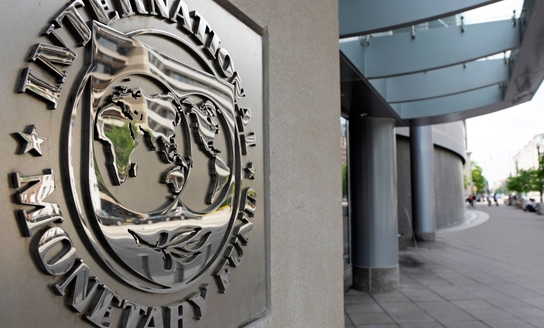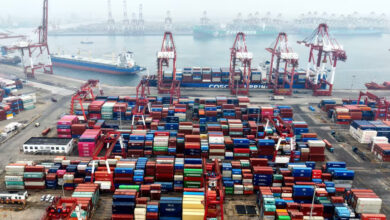
Though largely billed as the country’s best and last hope to balance a growing budget deficit and to alleviate a currency crisis, the Egyptian government’s re-initiated talks with the International Monetary Fund (IMF) remain contentious.
“It’s quite controversial for a transitional government that does not represent the people by any means, to negotiate the loans,” said Amr Adly, director of the Economic and Social Justice Unit at the Egyptian Initiative for Personal Rights. “At the least, these talks need to be transparent.”
On Thursday, the IMF confirmed that it was sending a mission for talks about possible financial aid. This visit will be the latest in several months of exchanges concerning the loans, which were first formally offered in June at US$3 billion.
Then, the initial rejection was received with various reactions. Many Egyptians applauded their government for remaining independent of Western interests and the conditions that might accompany loans. Some economists and analysts, though, warned that the country’s leaders were foolhardy to turn away the international loans in the rebuilding period, which typically would have the lowest interest rates.
“At the time, I think it was a big mistake,” said Magda Kandil, executive director at the Egyptian Center for Economic Studies. “Not because they rejected the loan, but because they did not accompany it with the right economic policies.”
The Supreme Council of the Armed Forces (SCAF) and Egypt’s interim leaders, Kandil said, rejected the loan but continued policies that drove the economy into the ground, failing to develop initiatives to help it recover.
Since it turned down IMF help in June, Egypt has seen the appointment of its third finance minister since January, Mumtaz al-Saeed. It has seen its currency reach its lowest value in seven years, despite an accelerated spending of foreign reserves to fend off depreciation. The country’s credit rating has been lowered, a measure of its decreasing ability to repay debt. The budget deficit is estimated to be over 11 percent of GDP. Tourism, one of Egypt’s biggest revenue generators, is still lethargic as sporadic unrest continues.
But the problem with the initial talks and those that will take place in the coming week is that they will still be predicated on opaqueness and a lack of good economic statistics, said Adly, who is also working on a debt audit initiative to examine debts incurred under Mubarak and encourage public awareness about the economy.
“We don’t even have accurate information,” he said. “They have to tell the real position of the foreign reserves and the budget deficit. And we have to know exactly where the money is going. We don’t want to take stances without knowing exactly what’s going on.”
The reasons for the government and SCAF rejecting the offer in June are unclear, whether it be due to popular opposition or political motives.
At the time, it seemed that Egypt would be relying on gifts from Gulf States instead of IMF loans, but most of that aid has not come through as expected.
Now many analysts say that IMF loans are the cheapest loans and the best option that the Egyptian government has available to it. Leaders simply cannot afford to borrow any more domestically, according to Kandil.
“The situation has become dire, and the only option at this point is to resort to a loan from the IMF,” said Kandil.
For critical political players also, there is a general belief that there are few options besides taking money from the IMF, with Egyptian government officials suggesting that they accept the loan, as well as members of the Muslim Brotherhood.
"There is no objection to borrowing. But it must be without conditions. And it should be in accordance with national priorities," Ashraf Badr al-Din, head of the Islamist movement's economic policy committee, told Reuters on Thursday.
The conditions that could accompany loans are what continue to worry some most.
Most recently, an alleged IMF list of 14 conditions for receiving loans has circulated in Cairo, including that the IMF would monitor Egypt’s economic performance and payments, and the implementation of a value-added tax and higher customs fees. Both the IMF and the Egyptian Finance Ministry later denied the document.
Conditions that require greater privatization, deregulation and more open market practices have been a concern for many since the loan was first offered.
In a May editorial for Egypt Independent, economist Adam Hanieh said loans from the IMF and the European Bank for Reconstruction and Development were “premised upon the classic neoliberal policies of privatization, de-regulation and opening to foreign investment.”
These types of loans, Hanieh said, will result in continuation of Mubarak-style policies of privatization and unbridled capitalism.
“If this process is not resisted, it threatens to negate the achievements of the Egyptian uprising,” he wrote. “In essence, the financial initiatives announced over recent weeks represent an attempt to bind social layers such as these — Egypt’s military and business elites, the ruling families and large conglomerates of the Gulf Cooperation Council, and so forth — ever more tightly to the Western states.”
IMF and EBRD loans frequently accompany policies that open economies to foreign markets and investment, often at the detriment of small, local economies that cannot compete against mass-producing competitors. The European Bank for Reconstruction and Development, in particular, has been criticized for using the same policies in Eastern Europe after that region’s own series of revolutions, forcing privatization, at the expense of the country’s lowest classes and working poor.
Other analysts looked to countries that have declined IMF loans. In a June editorial, Al-Shorouk’s managing editor and economic writer Wael Gamal, wrote that Malaysia could provide a model for Egypt, after it turned down IMF loans in 1997. Thanks to a government debt for restructuring and cooperation, he said, their economy was growing again by 2000 without outside interference.
It is also probable that the IMF’s package this time will not have such favorable terms for Egypt. Since its credit rating has been lowered, the loan will likely have higher interest rates.
“To come back and offer the same deal, would be a lot of risk for the IMF,” said Kandil.




